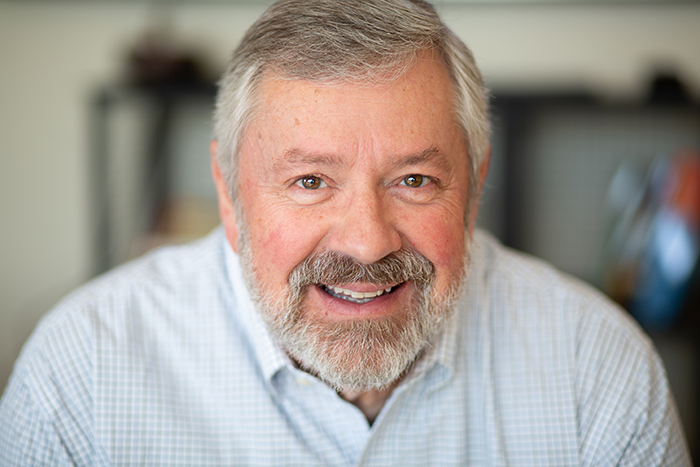Good leaders don’t just happen. Neither do those who train and develop them. They have their own stories and journeys bringing them to their personal philosophies on leadership. These journeys started miles away and decades ago from current Lancaster Bible College’s leadership courses, programs and degrees.
The leadership journey of Dr. Michael Badriaki, program director of LBC’s Master of Arts in Ministry, started on the African continent. Born in Kenya and raised in Uganda, Badriaki credits his parents as examples in overcoming adversity and suffering.
“I realized early on the brokenness in the world – war, diseases, poverty, the feeling of hopelessness. Life is full of suffering,” he shares. “But it is also full of joy – especially the joy found in Christ.” He recalls then asking himself what he could do to lessen this suffering in the world and experience more meaning in life.

Above: Dr. Michael Badriaki poses outside of the Charles Frey Academic Center at LBC. He joined the college’s faculty in 2018.
When he became a Christian in his early teens, he saw how the Gospel taught about abiding in Christ, adopting responsibility and understanding the meaning of life. He remembers connecting with the concept of Christ increasing while he decreases. “Jesus can do that,” he says. “I want that. I want to be a disciple when things are good and when things are bad. I’d like others to be treated with respect.”
That is the basis of his personal transformation of further developing Christian characteristics of honesty, truthfulness, love, patience and forgiveness. Characteristics that he admits can be difficult to do, yet they are important within leadership roles. “It is easy to be resentful, a couch potato and even blame others,” he shares. “How can you, how can I, as a parent, friend, neighbor [lead] from that spirit?”
This focus on personal responsibility and ultimately discipleship, according to Badriaki, ties into being a good leader. “Jesus demonstrates that as a disciple, you are a leader,” he shares. “A demonstration further focusing on humility. Humility is at the core of leadership. It is a competence that becomes a forgotten quality. Everyone talks about influence. Influence for what? The means? The end?”
This idea of humility was illustrated at the highest level, says Badriaki, when Jesus “left his father’s domain to come here on earth to meet us where we are.” This humility is important as Badriaki acknowledges leadership has received a bad rap through the focus on bullies, narcissism and even abuse by those simply portraying one thing to create a means to an end.
According to Badriaki, good leadership involves trust and humility. “Who pastors the pastor? Who leads the elders?” he asks “Leaders can’t do it by themselves. [As a leader,] surround yourself with healthy people who are vulnerable and truthful. Leadership is holistic in Christ.” Leadership, however, means learning the process, theory and skills because “when washing [people’s] feet you will deal with people’s issues,” he shares.
CARING DEEPLY
The leadership journey of Dr. James “Doc” Ayers (’80) has focused on caring deeply and loving those around him. This comes from his own personal experience of being raised by a generation hesitant to simply say, even to their own children, the words “I love you.”
He says these three words at the end of every class period in his current role as the mentoring professor and director of all academic TraveLearn tours and study abroad opportunities at LBC. Three words he has said while teaching numerous classes and students since joining LBC’s faculty in 1993. Three words he has said in more than 40 years of pastoral leadership in various roles. These three words aren’t just empty words when he voices them. He means them fully.

Above: Dr. James “Doc” Ayers sits for a portrait at Lancaster Bible College. An LBC alumnus himself, Ayers has taught at LBC since 1993.
“People need to know they are loved,” he shares. “People are coming from broken, wrecked, dysfunctional homes and chaos. If we want them to understand the love of God, we have to have ways to show that.” He acknowledges the controversy this can bring in our current culture as guards are already elevated. He noted that there is no shame in public displays when you love those you are leading. Sometimes this simply means asking someone if they are doing okay, being willing to listen and interact and even offering a hug with permission. “Anyone can say anything on a platform,” he emphasizes. “People want to know you care personally about them.”
His life verse is 1 Thessalonians 2:8: “Having so fond an affection for you, we were well pleased to impart to you not only the gospel of God but also our own lives, because you had become very dear to us.” Ayers emphasizes this verse speaks volumes of caring deeply. One that reminds him “you can’t lead people if they don’t know you care.”
This also ties into the integrity of a leader. He acknowledges integrity has been elevated to the forefront of attention and media due to scandals. “People are looking at the level of integrity of leaders,” he says. “Is this person real? Can I trust this person? Will they listen to me?” All of which returns to a focus on servanthood and learning about those you lead. “What makes their heart beat?” Ayers asks. “Before I lead them, [I have to consider] have I earned the right to be heard?” He reminds us that even Jesus identified first as a servant and earned that trust from those he led. This type of trust leads to further conversations and leadership interactions with both believers and unbelievers.
Another way Ayers shows he cares deeply as a leader is through the “gift of time,” which he further describes as a “nonrenewable resource” and “an investment into their well-being.” This translates into him being willing to meet with students, friends, church members and basically anyone who wants to discuss any issue. Of course, he suggests different environments provide different manifestations of this gift of time and caring deeply. His reminder is that “common denominators [exist] in leadership but it is not a formula.” In other words, a repeating scenario and circumstances of “if then” and “when” can’t be created and continually replicated within leadership. The importance is knowing that the person you are leading is cared for, loved and you want to hear their story. This goes beyond praying for them as Ayers shares “little things open the opportunity to lead [them] wherever they are at any age at any stage.”
LEARNING LEADERSHIP
Both Badriaki and Ayers agree leadership can be learned at any age. Both also agree learning to lead often involves being trained through the leadership process of learning practical and biblical theory as well as learning how to handle the issues that arise in leadership roles, what is true with influencing others, what is inviting toward Jesus and how to gain confidence as a leader. This means, according to Badriaki, to place yourself in a leadership learning process if you aren’t sure how to develop your gifts and interest in leadership.
“It’s never too late to be redeemed by Christ,” Badriaki shares. “The journey of discipleship begins with servant-leadership, integrity, truthfulness.” Ayers agrees being a lifelong learner is critical to being a successful leader. “I can learn from every person I meet: believer and unbeliever,” Ayers shares. “Sometimes I learn what I do not want to do. Sometimes I learn what I want to do. Leadership skills are growing, changing, morphing who God wants us to be. To stop learning is to stop leading.”
Those who resist leadership are encouraged to reflect on that reluctance and discover the “why.” Is it temperament, background, confidence, lack of skills or lack of preparation as Badriaki questions. Ayers further emphasizes the importance of discovering the answer to this “why” question before someone is put into an unwanted leadership role.
He also suggests those hesitant consider their own personality. People often gravitate toward those who are charismatic, Ayers says, but those “hidden behind the curtain” are leaders too. When he sees the leadership potential in others, Ayers will encourage them that “if you want to develop” those skills, situations and learning settings are available to “cultivate those skills.”
He emphasizes the “if” in those conversations with others. “The last leader I want is someone who doesn’t want to lead,” Ayers shares. “If it isn’t the right fit, bad experiences and dropout rates [in ministry] can increase. Bad experiences typically create this resistant reaction. Part of the journey then may be the healing in their heart.” And this healing of the heart is important within leadership because good leaders are healthy leaders. “Someone has to serve. We need leaders, believers, who are healthy people,” Badriaki shares.
